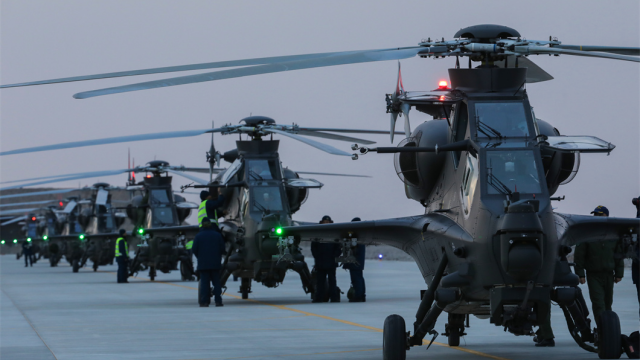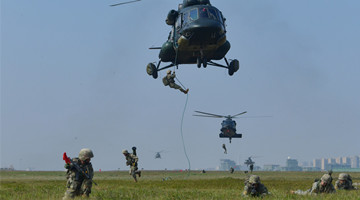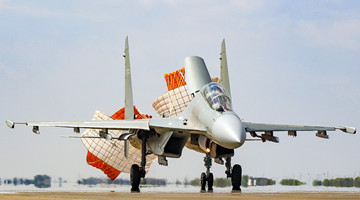By Li Shuyin
At this time last year when U.S. President-elect Trump was about to enter the White House, people thought that as he had frequently shown his good will to Russia during the presidential election campaign, he would shake hands with Putin, and the tension between Russia and the U.S. would ease, perhaps the two countries might even enter a " honeymoon period."
However, over the past year, the tensions between Russia and the U,S, have not only been alleviated but have somewhat increased in various areas, from "diplomatic war", "media war" to Intermediate-Range Nuclear Forces Treaty controversy, from Syria, Ukraine to the Baltic Sea.
In the future, the development of bilateral relations will continue to be tested by the Ukraine issue, Syria issue and "Russiagate." Meanwhile, the upcoming Russian presidential election in March this year will also become a touchstone for the relations between Russia and the U.S.
Ukraine issue the biggest obstacle
Because of their different positions, it is always difficult for Russia and the U.S. to find a meeting point on the Ukraine issue. The two countries not only frequently engage in diplomatic disputes but also have encounters between military planes and warships in the Baltic Sea.
Russia insists that the security of the eastern part of Ukraine is a matter of national interest and that Crimea is an inalienable part of Russia. On the other hand, it states that NATO has become the greatest threat to Russia’s security by enhancing its military deployment in Eastern Europe in the name of supporting Ukraine.
It is obvious that the Ukraine issue has become the biggest obstacle to the improvement of the relations between Russia and the U.S. The U.S. Secretary of State Rex Tillerson said in a recent New York Times article that the relations between the two countries will not be normalized if the Ukraine issue cannot be solved peacefully.
Russian Defense Minister Sergey Shoigu pointed out at the expansion meeting of the Defense Ministry that since the Ukraine crisis NATO has conducted thousands of exercises targeting Russia on that country's western border, 548 exercises in 2017 alone. To defend its own interests, Russia will continue to support non-governmental militias in eastern Ukraine, continuously strengthen military deployment in the western region, and conduct large-scale military drills to deter the NATO forces deployed in Eastern Europe.
On the other hand, the U.S. has opposed Russia's "acts of aggression" by supporting the Ukrainian government. On the same day as the Russian Defense Ministry’s meeting, the U.S. government approved the sale of the M107A1 long-range sniper rifle and related equipment worth $41.5 million to Ukraine to enhance its "defense capabilities" and help "safeguard the sovereignty and territorial integrity of Ukraine."
In response, the Russian Foreign Ministry strongly criticized the sale of the weapons to Ukraine as crossing a red line and said that the sale is actually encouraging Ukraine to use force. In protest, the Russian delegates withdrew from the Joint Center for Control and Coordination of Ceasefire and Stabilization of the Line of Separation of Parties (JCCC). Obviously, the Ukraine issue will continue to affect American and Russian bilateral relations.
Hard to make breakthroughs on the Syria issue
Russia's military operation against the extremist organization "Islamic State" in Syria has proceeded smoothly since last year. This progress has infringed on the U.S.’s plan of overthrowing the Assad regime but has also expanded Russia’s influence in the Middle East and created a firm alliance between Russia, Turkey, Iran and Iraq.
In addition, Russia started the Syrian peace talks in Astana without U.S. participation and will hold talks regarding Syria with Turkey and Iran. Russia is having an increasingly greater influence in the Syrian peace process.
At the same time, Russia also urged the U.S. to withdraw its troops from Syria on the ground that "Islamic State" in Syria was basically eliminated. Chief of the General Staff of the Armed Forces of the Russian Federation Valery Gerasimov has repeatedly stated that the U.S.-led anti-terrorist operations in Syria were illegal because they were not authorized by the Syrian government or the UN.
Gerasimov also said that the U.S. military base and its surroundings in Syria have become a "black hole" where terrorists can move freely., It seems to be proving his words. The Russian Hmeymim air base came under a terrorist attack on Dec. 31, 2017, resulting in the death of two Russian soldiers.
It has also been reported that at least seven Russian military aircraft were destroyed by rebel shelling at the Hmeymim air base in Syria on Dec. 31. Russian media said there was evidence that the U.S. was involved in the incident because it had been training "Islamic State" militants in its base in Syria.
In fact, Russia is confident about gaining dominance in the Middle East. Just two weeks after Putin announced the withdrawal from Syria, he approved the permanent presence of Russian troops at the Hmeymim air base and the Tartus naval base.
It seems that after the elimination of the "Islamic State", the battle between Russia and the U.S. over dominance in Syria and post-war re-construction will intensify.
Russiagate is a knotty problem
Trump has undergone considerable pressure on Russiagate over the past year. Many US political elites have always been uncomfortable with "Russian interference in the US presidential election," and the U.S. Congress will not give up the Russiagate investigation.
Trump has to make some strict moves against Russia to prove his innocence. He has issued a number of sanctions against Russia and appointed people who take a tough stance towards the country to important positions.
The U.S. "National Security Strategy Report" issued on Dec. 18 last year even defined Russia as a strategic rival to the U.S. and said that the U.S. will implement new sanctions against it.
As retaliation against Russiagate the U.S. Democratic Party is preparing to affect the 2018 presidential election in Russia. According to Russian media reports, the U.S. is ready to disclose the status of overseas assets of top Russian officials on the election’s eve.
If that is the case, the two countries are official enemies in the general election issue. Putin, who will undoubtedly be re-elected, will certainly not let go. It is foreseeable that Russia and the U.S. will experience various kinds of frictions in 2018.
But both Russia and the U.S. have the will to improve bilateral relations. During last year's G-20 summit in Hamburg, Trump and Putin held long talks. Trump and Putin also shared several phone calls at the end of last year. In addition, the U.S. intelligence department informed Russia of pending terrorist attacks in St. Petersburg and helped Russia avoid a terrorist catastrophe.
However, it takes a river more than one cold day to freeze three feet deep and therefore it takes more than a day to thaw. It will be impossible to improve bilateral relations if the two countries cannot find proper breakthroughs and enough points of interests.
(By Li Shuyin, a female professor with the war research institute of the PLA Academy of Military Science)









